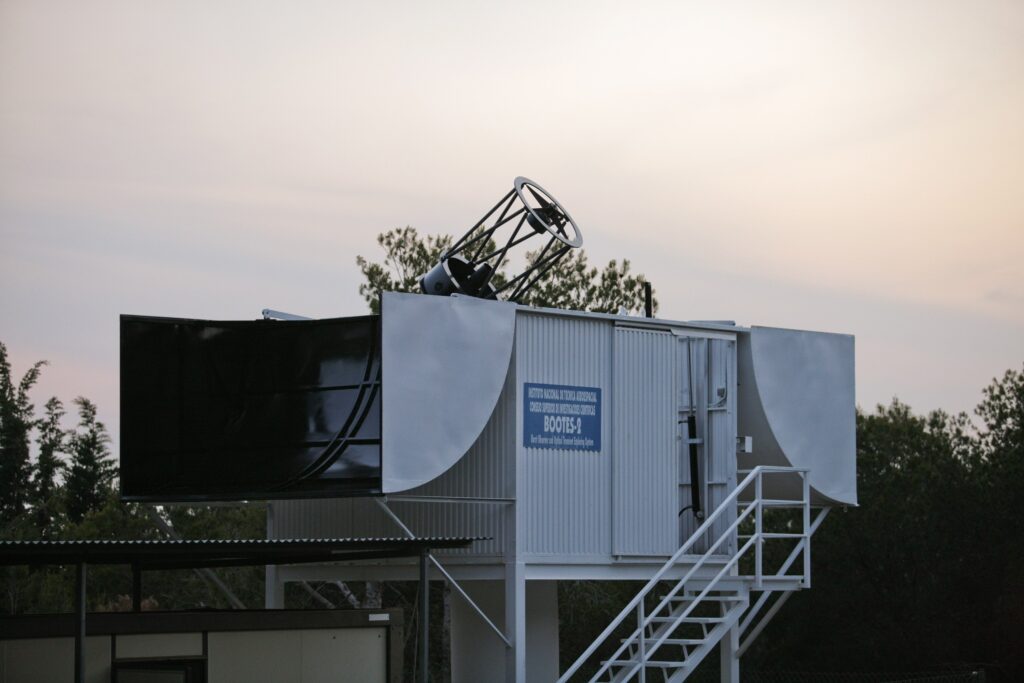BOOTES-2 is the second robotic observatory of the BOOTES Global Network of robotic telescopes BOOTES. The BOOTES-2 robotic astronomical station was officially opened on 7 Nov 2001 by José Torres and Marisa Gómez-Guillamón as INTA and EELM-CSIC representatives respectivelly. It is located at CSIC’s Estación Experimental de La Mayora in Algarrobo Costa (Málaga) and it is limited to the South by Mediterranean sea and to the North by the Natural Park of Tejeda-Almijara mountains with Maroma peak (2.068 m. of high). Its main scientific objective is the observation and monitoring of the optical counterparts of gamma ray bursts as quickly as possible once they have been detected from space-borne or ground-based observatories. The BOOTES-2 telescope was named TELescopio MAlaga (TELMA), following the nearby town of Málaga, a major turistical destintation in Costa del Sol, Spain. The BOOTES-2 observatory is a collaboration between the Institute of Astronomy of the Institute of Astrophysics of Andalusia (IAA-CSIC), the University of Málaga (UMA), and the Instituto de Hortofruticultura Subtropical y Mediterránea “La Mayora” (IHSM/UMA-CSIC), all Spanish institutions.

BOOTES-2 started hosting a 0.3-m Schmidt-Cassegrain reflector telescope (f/10) which was replaced in 2009 by a 0.6-m Ritchey-Chrétien fast slewing telescope, being officially opened on 27 Nov 2009 by Prof. José Ángel Narváez, vicerrector of Research at University of Málaga. Therefore it uses nowadays a dedicated 0.60 m f/8 Ritchey-Chretien telescope located at Boyden Observatory, near Algarrobo-Costa, Málaga, Spain (Latitude 36° 45′ 33″ N, Longitude 04° 02′ 27″ E, Elevation 70 m). The telescope has an ASTELCO NTM-500 mount with a maximum slewing speed of 20 degrees per second. The optical tube is made of carbon fiber to minimize the moment of inertia to reach it maximum slewing speed and to reduce the focus changes for thermal expansion. It operates in an open air dome.
In July 2021 the station was upgraded with a new multi-model instrument, COLORES (COmpact LOw REsolution Spectrograph), as a result of a collaboration with the Astronomical Institute in Ondrejov (Czech Academy of Sciences) that can switch from imaging a field to spectroscopy by rotating wheel-mounted grism, slits and filters.
Nowadays, the BOOTES-2 astronomical station instrumental setup is the following one:
| BOOTES-2 (TELMA) | |
| Mount | Astelco NTM-500 |
| CCD | Andor iXon EMCCD |
| Focal Length | 4800 mm |
| F | f/8 |
| Image mode | |
| Field of view | 10.3 arcmin |
| Filters | Johnson R Sloan g’, r’, i’ UKIRT Z and Y |
| Spectroscopy mode | |
| Spectral scale | 7.8 Å/pixel |
| Slits | 20/50/75/10 μm |
| Wavelength range | 3800-11500 Å |
| Lamps |
Kr & Ar/Hg |
| – | – |
| All-sky CCD camera | |
| CASANDRA-1 | |
| Field of view | 180 deg |
We appreciate the generous contributions of both Universidad de Málaga and Fundación Málaga to the project.